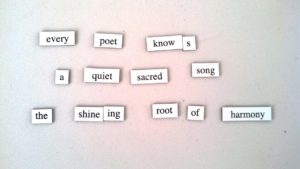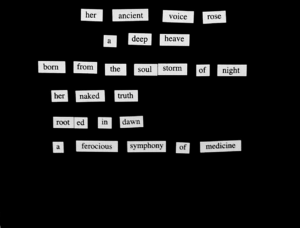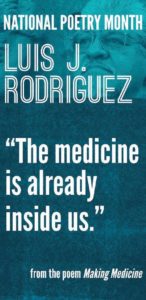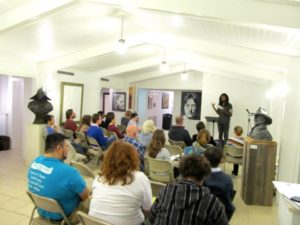By Alicia
What comes to your mind when I say Autistic? Who do you picture in your head? Perhaps a child in your neighborhood who flaps their hands with happiness? Or an adolescent who gives you a detailed account of the solar system’s activities? Maybe the adult from church, who rocks back-and-forth during most services?
Perhaps you have heard that autism is a spectrum. But what does that mean? Autism is a developmental disability and another way of being in the world. To describe behavioral traits common to autistic people, we begin with the medical model, the DSM-5 entry for autism spectrum disorder (APA, 2013, pp. 50-51).
– Social communication impairments
– Restricted and/or repetitive behavioral patterns
**********************************
But this entry isn’t complete. It describes what autism looks like, but fails to describe the everyday lives of Autistic individuals. I lapse into academic language when I try to write about autism from a perspective other than my own. I attempt to describe autism in behavioral terms, rather than lived experiences, and get lost in this phrasing.
It is no easier to write about autism from a clinical perspective. For me, the personal is academic. I began reading about autism because I wanted to better understand my friend from undergraduate studies, a young woman with Asperger syndrome.
***************************************
“Many of us will become interested in psychology and the helping professions along the way, either because of our diagnosis or in search of it. We find we want to nurture and help others in their journeys because we know how hard it can be.” ~ Rudy Simone, Aspergirls
Perhaps I am in-between these spaces — the personal and the academic. Not entirely ready to come out, for fear I might be wrong about myself. For the past two years, I’ve read autism blogs and books, immersed myself in the online Autistic community, and befriended women like me. We are writing a narrative of what #AcceptanceMeans.
*****************************************************
Becoming (not finding) yourself is neither a linear, nor coherent process. In the spring of 2013, I first acknowledged my Autistic traits. I remember reading Rudy Simone’s book, Aspergirls. I took copious notes, surprised how the experiences she described resonated with my own.
With the support of the women in my writing circle and like-minded women online, I continued to explore this narrative through research and poetry. April is Autism Acceptance Month. Perhaps acceptance begins with myself.
*****************************************************************
How long will I have to mince my words? You see, I have these traits – I’m 85 to 95% sure that this is who I am. I’ve lived in euphemistic dialogue for some time now…
I’m socially different, sensory sensitive; missing gist for detail. This is who I am, regardless of how you choose to see me, label me. We sustain ourselves in these Voldemorty spaces – that which shall not be named.
I’m autistic. Not that you’ll believe me. We’re unicorns. The highly verbal, completely awkward, often confused. I’m not a 12-year-old boy who likes trains. Does that surprise you? It shouldn’t.
My passions are information gathering, sorting, and sensemaking. That’s why I’m here today. I brought a list of all the things you might think are wrong with me – I prefer different. This is merely a collection of traits – some of which get me stuck. Please don’t medicalize me, marginalize me.
This is new to you. Not to me – I’ve been this way my entire life – just hadn’t found my coherent narrative. Hadn’t imagined there were others like us, rising in dust and hashtagging it – dialoguing across countries and timezones. Other women like me, yet utterly alien in their own spaces.
We are developing our own dialogue, a shared narrative – together. I see us in a decent-sized room, sitting at a table, offering virtual cups of tea.
Remembering.
Verbalizing.
Being.
In this created space – creative space. We are ourselves, with little explanation. Needing no one else to fill in our gaps. We are our own. Here anyway. Coda. Yet this space, although not enough, is a starting point. Free from labels or to label as we wish. Existing together in a shared collage of narratives.
Of course this text-based medium would serve us well. Free from constraints of nonverbals and missed cues.
We are here in this place. We fit. We belong. And we are enough. Together.
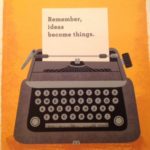 Alicia is a graduate student at Baylor University. She writes for reasons both pragmatic and personal. She became involved in the Waco arts community through In the Words of Womyn – Heart of Texas.
Alicia is a graduate student at Baylor University. She writes for reasons both pragmatic and personal. She became involved in the Waco arts community through In the Words of Womyn – Heart of Texas.
For more information about Autistic women, visit Autism Women’s Network (http://autismwomensnetwork.org).
For general autism resources, visit Autism Society (http://www.autism-society.org) and Autistic Self Advocacy Network (http://autisticadvocacy.org)
Local programs for individuals on the autism spectrum include:
- Heart of Texas Autism Network (http://www.hotautismnetwork.org)
- ARC of McLennan County (http://www.wacoarc.org)
- Baylor Center for Developmental Disabilities (http://www.baylor.edu/bcdd/)
The Act Locally Waco blog publishes posts with a connection to these aspirations for Waco. If you are interested in writing for the Act Locally Waco Blog, please email [email protected] for more information.
References:
American Psychiatric Association. (2013). Diagnostic and statistical manual of mental disorders (5th ed.). Washington, DC: Author
by Dawn Wible
- A friend blankly stares across the table while you check your texts. As she anxiously awaits an answer, you have no idea what she just said.
- Your four year old is describing his new friend at school, but you are busy scrolling through the newsfeed and missing the whole story.
- Vegging on the couch was the agenda for the night but instead you are responding to a work email at 11:15pm, because really, what are “work hours” these days anyway?
We have all found ourselves in these situations, myself included. It truly is a sign of the times.
The two questions I ask myself are: “Why am I choosing to put my relationships on the back burner?” and “When and where is the best time to be on my device?” I believe we do not even realize we are making these small and influential choices. Statistics and studies are actually showing a change in our brain function due to technology addiction. Many neurologists and psychologists are pointing to our dependence on technology as the root of many mental, physical, emotional, spiritual, social and relational issues. These issues range from poor academic or job performance, to job loss, lack of social connectedness, sleep disorders, divorce and in some cases even death.
There’s a crucial conversation happening in our culture concerning the problem of tech addiction, and my family and I want to be a part of the solution! This idea has become so important to the mental health of my family that we started a local movement: Talk more. Tech less.
Talk More Tech Less is for myself, and essentially anyone who uses technology in this tech heavy culture. This is not an anti-technology movement; it is a pro-relationship movement. I’m a mom of three BOYS and technology is very much a part of my family’s life. But, we struggle with the overuse and addiction that causes tantrums, irritability, ignoring, zoning out…you get the picture. Like most of you, my phone is my home and work computer in hand. It helps me to be efficient – way more efficient than I would be without my device. It is valuable, but it also distracts me from the life going on right in front of me. I realized a few years back that I needed to shift my perspective and priorities. I saw it not only in my own life, but in society as well. We can get lots of information, facts and communication from our phones, but what we’re missing is the emotion, the conversation, and the connection that should come with communication.
Talk More Tech Less was birthed from mentoring and spending time with teenagers. My husband, Matt, runs a Waco based organization called Field Guides that mentors young men through outdoor activities. We have seen first- hand the benefits of getting young men away from all the distraction and overuse of technology, video games, smart-phones and computers and getting them outside! As the CRC Health Group says, “There is a strong body of research confirming that direct contact with nature increases mental health and psychological and spiritual development. Benefits include stress reduction, a sense of coherence and belonging, improved self-confidence and self-discipline, and a broader sense of community.”
At Field Guides summer camps we have participants take one-week breaks from their phones. Working with these guys year after year our eyes have been opened to some true dependency issues involving technology. We have also been privileged to see the breakthroughs that happened as they embraced this process. With those experiences as background I began researching tech dependency and addiction stats and saw the great need in this culture for balance and freedom.
Last summer we had the campers construct boxes for their phones. We encouraged them to take the boxes home and use them with their families. The idea is that family members place their phones in these “Detox Boxes” during meal times and other important moments during the day and night.
Our own family’s experience with technology balance, my research into this subject, and the success of this “detox box” idea convinced me that other people could benefit from a structured way to explore and reduce dependency on technology. That led me to create the Talk More Tech Less 30 Day Experience. The 30 day experience is designed to strengthen relationships and create awareness about the overuse of technology. It is a guide to empower individuals, families, and groups to find balance, leading to greater connection. I hope it will help those who use it gain control of this growing concern in our culture and world.
The 30 Day Experience includes a custom made “Detox Box”, 30 daily note cards, a journal and a decal. The box is created to place our devices in during strategic times throughout the day. They are locally crafted here in the 254, by Sticker Universe and Hole in the Roof Marketing. The daily note cards are a true journey to healthy technology usage. Each card takes approximately 90 seconds per day, so as not to take up time, but to give it back. Those involved are actually surprised at how much time they have on their hands during the 30 days.
Research shows negative effects from the lack of face-to-face, eye contact, physical, spiritual and emotional contact. In the 30 Day Experience we pool all that information and combine it with practical ways to deal with and replace this dependency issue. Talk More Tech Less is designed to bring conversation and connection back to our culture. We’d love you to be a part of this movement! For more information please visit us at www.talkmoretechless.com
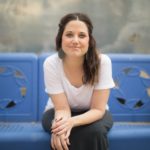 Dawn Wible is the creator of Talk More. Tech Less. She is a Waco resident and graduate of Baylor University. Her husband, Matt founded and runs an outdoor ministry, Heart of Texas Field Guides, that mentors young men through outdoor activity. Together they raise 3 amazing boys, Levi, Jude and Ty. Dawn finds life in deep connection with family and friends, volunteering, kayaking, cooking, jogging and she loves a good party.
Dawn Wible is the creator of Talk More. Tech Less. She is a Waco resident and graduate of Baylor University. Her husband, Matt founded and runs an outdoor ministry, Heart of Texas Field Guides, that mentors young men through outdoor activity. Together they raise 3 amazing boys, Levi, Jude and Ty. Dawn finds life in deep connection with family and friends, volunteering, kayaking, cooking, jogging and she loves a good party.
The Act Locally Waco blog publishes posts with a connection to these aspirations for Waco. If you are interested in writing for the Act Locally Waco Blog, please email [email protected] for more information.
By Cecelia Rodriguez
Do you have an older friend, or perhaps a friend with a disability, who is on a limited income? Booth Garden Apartments might be the perfect home for him or her. We are proud of the environment we have created here at Booth Gardens, and we would like to make sure that those who might need a place like Booth know that it is here for them.
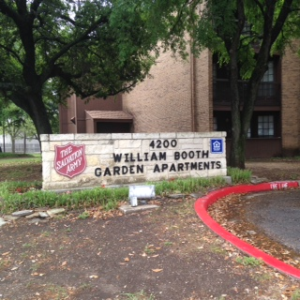 The Booth Garden Apartments are an independent housing community owned and managed by the Salvation Army. We provide safe and comfortable living conditions at affordable costs for seniors, and those with federally defined disabilities, who have limited incomes. At Booth Garden Apartments, residents can live in an atmosphere of love, acceptance and encouragement.
The Booth Garden Apartments are an independent housing community owned and managed by the Salvation Army. We provide safe and comfortable living conditions at affordable costs for seniors, and those with federally defined disabilities, who have limited incomes. At Booth Garden Apartments, residents can live in an atmosphere of love, acceptance and encouragement.
The Booth Gardens Apartments are one-connected building, but they are actually two separate projects: William Booth (which faces N. 19th) and Catherine Booth Garden Apartments (which faces Stewart Dr.). William Booth was first opened for occupancy in 1983 and Catherine Booth was later opened for occupancy in 1997.
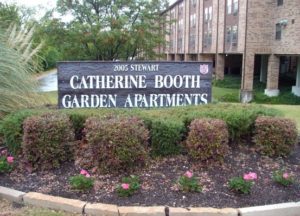 The buildings are four stories high, and together contain 196 one bedroom apartments. The apartments include added amenities especially designed to benefit our two target audiences: persons 62 years of age or older, and persons 18 or older who have a federally defined disability. William Booth is for those who are 62 years of age or older and also for those that are at least 18 years of age with a federally defined disability. Catherine Booth is just for senior citizens, 62 years of age or older.
The buildings are four stories high, and together contain 196 one bedroom apartments. The apartments include added amenities especially designed to benefit our two target audiences: persons 62 years of age or older, and persons 18 or older who have a federally defined disability. William Booth is for those who are 62 years of age or older and also for those that are at least 18 years of age with a federally defined disability. Catherine Booth is just for senior citizens, 62 years of age or older.
We contract with HUD (U.S. Department of Housing and Urban Development) which provides subsidized rent for our residents. The apartments are reserved to be safe, comfortable homes for people with limited income. Annual income limitations (which are subject to change annually) are currently $19,150.00 per year for a single person and $21,900.00 per year for couples. The exact rent charged is based on a formula which takes into account the residents’ adjusted gross income, assets and medical expenses.
Here are some of the things residents appreciate about living at Booth Gardens:
- A group of our residents have formed a very active “Tenant Council” which meets monthly. They lead numerous activities ranging from trips to lunch fundraisers and are continuously working to be a voice for our residents.
- We offer a variety of activities including weekly bus trips to H-E-B and Walmart.
- There is a 24 hour response system in case of emergencies. Emergency pull-cords are available near the beds and in the bathrooms of each apartment and can be put to use in case of a medical emergency.
- Multi-faith groups come-in to conduct spiritual programs. We also enjoy a variety of educational programs hosted by local home healthcare agencies.
- We have a resident chaplain, Major Harvey Harwell. He leads regular Bible studies and devotion times and offers counseling to those who need it.
- Our resident services coordinator, Mrs. Barbara Parnell, is also available to help residents meet their own needs.
- Domesticated pets are welcome.
- We have a total of 3 laundry facilities.
- Although we are independent living, many of our residents have private contracts with home-health care agencies that enable them to remain independent.
- We have a partnership with “Meals and Wheels” program which provides lunch meals to our residents three days a week.
- Friends for Life is a partner and has helped some of our residents meet financial management and budgeting needs. This also helps them to stay independent longer.
It has been an honor and a pleasure to serve with The Salvation Army Booth Garden Apartments for the past 10 years. I cherish every moment participating in and assisting with housing for senior citizens. Several years ago I lost my mother, who was disabled, and shortly after, an elderly aunt. They are my inspiration for being part of this wonderful ministry. Like many others, they were on limited means of income, and faced health challenges. They struggled to maintain the aging, deteriorating home in which they lived. We hope that our residents are able to be as independent as possible, for as long as possible and receive the dignity and respect they deserve in a safe and affordable home. If you know someone who is looking for a home who you think might be a good fit for the Booth Gardens, please contact us! You may contact me, Cecilia Rodriquez by email at [email protected], or our Assistant Director, Rachel Sheridan at [email protected], or call either of us at (254) 757-2242. We look forward to hearing from you!
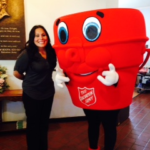 This Act Locally Waco blog post is by Cecilia Rodriquez. Cecilia began her ministry with The Salvation Army Booth Gardens Apartments as the receptionist 10 years ago and is now the Director of both properties. She is a Certified Manager of Housing and Certified Occupancy Specialist through the National Center for Housing Management. She has a passion for senior citizens and also enjoys being an active part in her children’s lives coaching in her spare time. She is family-driven and thrives on helping to make a difference in people’s lives as she carries out the mission of The Salvation Army.
This Act Locally Waco blog post is by Cecilia Rodriquez. Cecilia began her ministry with The Salvation Army Booth Gardens Apartments as the receptionist 10 years ago and is now the Director of both properties. She is a Certified Manager of Housing and Certified Occupancy Specialist through the National Center for Housing Management. She has a passion for senior citizens and also enjoys being an active part in her children’s lives coaching in her spare time. She is family-driven and thrives on helping to make a difference in people’s lives as she carries out the mission of The Salvation Army.
The Act Locally Waco blog publishes posts with a connection to these aspirations for Waco. If you are interested in writing for the Act Locally Waco Blog, please email [email protected] for more information.
By David Saucedo
The Reinforced Earth Company is a precast concrete company that is part of a national and international conglomerate comprised of construction, technology and concession companies, among others. We are located in China Springs and we employ between 150 to 160 people, many of which are Waco residents.
My personal passion for community change and empowerment has played out in many ways over the last four to five years, but the last two years have been amazing! When I was hired at Reinforced Earth in 2013, I never thought the most enlightening and fulfilling work so far would take place at this company, but it has. I was blessed with opportunities, and I advanced to become the Safety Coordinator in late 2013. This promotion opened doors that I would have never imagined and allowed me to work with some terrific people who have taught me a great deal about what we call “foundational employment” – employment that is foundational to a stable lifestyle.
The Reinforced Earth Company’s Waco plant, managed by James Ashley, is paving a new road in employee development. We focus on a quality made product, produced in a timely manner, as safely as possible. But most importantly we are aiming to promote healthy and stable lifestyles to the men in our community that work here. From a business perspective, it goes without saying that a high turnover rate interferes with those goals and makes it very hard to establish maximum efficiency. In 2014 our company on average employed 58 workers per month through local staffing agencies. This not only increased the cost of producing our product, but it also led to a workforce with less experience and more potential for mistakes or injuries.
We began our work in foundational employment by using encouraging messages in our safety toolbox meetings. For example, we would use words like, “This is a family out here,” or “We want you to use Reinforced Earth as a foundation for your family.” We encouraged car pools to help employees who didn’t have transportation, showing that we are here to help. We introduced simple budget spreadsheets and encouraged employees to ask how they could escape the check-to-check lifestyle. Our most recent, and I think our most fruitful step has been referring and encouraging our employees to a local psychiatrist that is covered by our insurance. In some cases we even covered the copay for employees who are more serious about improving their standard of living.
I’m very proud to report that this month we will be reporting that fewer than 20 employees are working at Reinforced Earth through local staffing agencies. We have increased production and decreased our production hours by improving our production procedures and focusing on better training and efficiencies. By no means would our efforts be considered a comprehensive study, but we are seeing results and we associate these results with the investments we are making in our employees.
From these experiences, I’m very confident that a company dedicated to promoting strong foundations in the lives of their employees will see improvements in the quality of their workforce, a decrease in their turn over, a reduction in overhead, and — the icing on the cake — an increase in their profits. What would our community look like if more companies were encouraged to promote strong and healthy foundations in the lives of their employees? That’s a question I have been asking myself more and more.
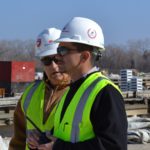 This Act Locally Waco blog post was written by David Saucedo. David is a local minister with Life Church Waco and has committed the last 8 years of his life to impacting his community in a positive way. David has a loving wife, Michelle and three beautiful children, Lianna (7), Isaiah (4) and Isaac (10 Months).
This Act Locally Waco blog post was written by David Saucedo. David is a local minister with Life Church Waco and has committed the last 8 years of his life to impacting his community in a positive way. David has a loving wife, Michelle and three beautiful children, Lianna (7), Isaiah (4) and Isaac (10 Months).
The Act Locally Waco blog publishes posts with a connection to these aspirations for Waco. If you are interested in writing for the Act Locally Waco Blog, please email [email protected] for more information.
By Donna McKethan
In the Fall of 2015, the Greater Waco Advanced Health Care Academy (GWAHCA) will open its doors to Waco area juniors and seniors who are interested in pursuing a career in the health care industry. The Greater Waco Advanced Health Care Academy is a unique and innovative collaboration between the local health care community and Waco Area School Districts. GWAHCA will create a challenging learning environment that encourages high expectations for student success in the Health Care Field. The academy will empower students to successfully be competitive and workforce ready in our community and a global society.
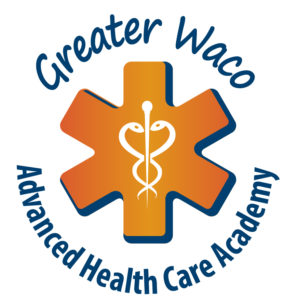 GWAHCA follows a model similar to the Greater Waco Advanced Manufacturing Academy, which aims to give students a head start in careers in welding and manufacturing. Officials from area school districts, McLennan Community College, Texas State Technical College and area health care industry leaders have been meeting over the last two years to determine health care industry needs and how to best serve students. The twin philosophies of realism and experimentalism are embedded in the attitudes and beliefs behind the planning and remodeling of GWAHCA. These philosophies have been expressed by the members of the GWAHCA Executive and Steering Committees. The idea behind not only the curriculum but also the facility is to give students an experience that aligns with what they will encounter when they graduate and begin a career in the health care industry. Partners support GWAHCA, an academy that fosters a sense of community among students, staff, parents, partners and neighbors. GWAHCA students will develop a sense of self-esteem and respect for themselves and others. Through a diverse and challenging curriculum, focusing on basic science, GWAHCA will cultivate student interest in various sciences and health professions. GWAHCA will provide a quality education and experiences that will prepare students to develop the academic, social and personal qualities necessary to realize their fullest potential as lifelong learners and productive, caring citizens of the world.
GWAHCA follows a model similar to the Greater Waco Advanced Manufacturing Academy, which aims to give students a head start in careers in welding and manufacturing. Officials from area school districts, McLennan Community College, Texas State Technical College and area health care industry leaders have been meeting over the last two years to determine health care industry needs and how to best serve students. The twin philosophies of realism and experimentalism are embedded in the attitudes and beliefs behind the planning and remodeling of GWAHCA. These philosophies have been expressed by the members of the GWAHCA Executive and Steering Committees. The idea behind not only the curriculum but also the facility is to give students an experience that aligns with what they will encounter when they graduate and begin a career in the health care industry. Partners support GWAHCA, an academy that fosters a sense of community among students, staff, parents, partners and neighbors. GWAHCA students will develop a sense of self-esteem and respect for themselves and others. Through a diverse and challenging curriculum, focusing on basic science, GWAHCA will cultivate student interest in various sciences and health professions. GWAHCA will provide a quality education and experiences that will prepare students to develop the academic, social and personal qualities necessary to realize their fullest potential as lifelong learners and productive, caring citizens of the world.
The first programs to be offered at GWAHCA will be the Certified Nursing Assistant (CNA) and Advanced CNA programs. The CNA curriculum will follow the current program offered at McLennan Community college. The Advanced CNA course is being developed in collaboration with Providence and Baylor Scott and White (Hillcrest) Hospital Staff. This curriculum development is an exciting process and will result in an amazing and rigorous program. In addition to the CNA course, juniors will also take Anatomy & Physiology, Counseling and Mental Health and Medical Terminology. Seniors (who have completed the CNA certification) will take Phlebotomy and a soft skills course that will include training in the hospitals computer system. Both hospitals have promised to hire all students who successfully complete the Advanced CNA program.
GWAHCA will be located on the campus of the former Viking Hills Elementary school. The campus is located on Viking Drive just off Fish Pond Road. All Juniors and Seniors within 45 minutes of the academy are eligible to attend. Applications are currently being accepted. For more information, contact Donna McKethan (254 755 9573 or [email protected])
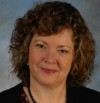 This Act Locally Waco blog post was written by Donna McKethan. Donna is the Career and Technology Director at Waco ISD. She has 33 years in education, the last 15 with WISD Career and Technology. She is currently the President of The Career and Technology Association of Texas. She is a WISD graduate with a BS in Home Economics Education from Baylor University and an MS of Education from Tarleton State University. She is currently enrolled in the Doctorial Program in Educational Leadership at Tarleton State University.
This Act Locally Waco blog post was written by Donna McKethan. Donna is the Career and Technology Director at Waco ISD. She has 33 years in education, the last 15 with WISD Career and Technology. She is currently the President of The Career and Technology Association of Texas. She is a WISD graduate with a BS in Home Economics Education from Baylor University and an MS of Education from Tarleton State University. She is currently enrolled in the Doctorial Program in Educational Leadership at Tarleton State University.
The Act Locally Waco blog publishes posts with a connection to these aspirations for Waco. If you are interested in writing for the Act Locally Waco Blog, please email [email protected] for more information.
By James Karney
Let’s go!
Batter up!
We’re tak-ing the af-ter-noon off!
It’s a beau-ti-ful day for a ball game, for a ball game to-day
The fans are out to get a ticket or two
From Wal-la, Wash-ing-ton to Kal-a-ma-zoo
– It’s A Beautiful Day For A Ball Game by Harry Simone
Spring is here and baseball opening day pitches are being thrown out from the Big Leagues to Little League.
In the Waco area hundreds of youth participate in Little League Baseball and Softball learning playing skills, teamwork, sportsmanship and character. I’d like to share with you about a division of Little League you probably did not know existed.
Challenger Little League provides the opportunity for children with physical, intellectual and developmental disabilities to play Little League baseball. During the April and May season, 125 area children play on a specially outfitted field with solid surface base paths at the Lake Air Fields with dedicated coaches and buddies guiding them. No matter the ability or skill level, “everyone plays!”
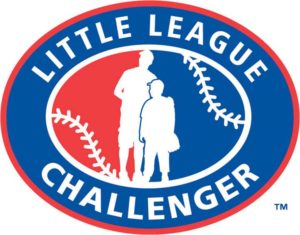 This year Challenger Little League in Waco celebrates its 25th season with children and teens from age 5 to 18 playing on ten teams. Challenger baseball came to Waco in 1990 as one of the first locations in Texas with 34 children participating that year.
This year Challenger Little League in Waco celebrates its 25th season with children and teens from age 5 to 18 playing on ten teams. Challenger baseball came to Waco in 1990 as one of the first locations in Texas with 34 children participating that year.
The kids have a great time just being kids playing ball and for parents it’s a little bit of normalcy just sitting in the bleachers with other parents watching their children play Little League baseball like any other parent.
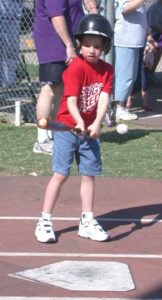 My son Jamie has played in Challenger since 2004 and I’ve been a coach since 2009. It’s been a great experience for both of us. When Jamie first played he’d hit the ball, run down to first base and then keep running straight down the right field line all the way to the outfield fence. Over the years his skill level has increased and he now hits a pretty mean line drive. I look forward to April and May, getting out my glove from high school and playing with the kids.
My son Jamie has played in Challenger since 2004 and I’ve been a coach since 2009. It’s been a great experience for both of us. When Jamie first played he’d hit the ball, run down to first base and then keep running straight down the right field line all the way to the outfield fence. Over the years his skill level has increased and he now hits a pretty mean line drive. I look forward to April and May, getting out my glove from high school and playing with the kids.
Challenger would not be possible without dedicated volunteers who manage league operations, coach, serve as buddies or team and league sponsors. Lupe Rosas, Don Deatherage and Michelle McCollum have worked with Waco’s Challenger League from its beginnings in 1990. Others like Coleen Ostrom and Pepper Jones make things run smoothly every year arranging for uniforms, volunteer buddies, fundraisers and more. Each of the ten Challenger teams has two or three coaches. Many of the coaches, like in other Little League divisions, are parents who want to share their love of baseball and sports with their son or daughter.
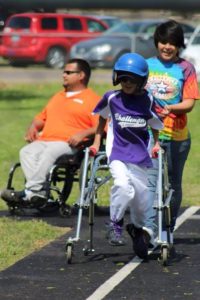 At every game you will also find buddies for the players. Buddies play a vital role in the game by being paired up with a player to provide them assistance they might need from pushing a wheel chair, putting on a batting helmet, keeping them focused on the game (and not watching airplanes flying overhead.) and most importantly encouragement.
At every game you will also find buddies for the players. Buddies play a vital role in the game by being paired up with a player to provide them assistance they might need from pushing a wheel chair, putting on a batting helmet, keeping them focused on the game (and not watching airplanes flying overhead.) and most importantly encouragement.
Some buddies volunteer for the season while others come out for a game or two. These buddies are frequently from other Little League teams or high school baseball and softball teams. Last season members of the Baylor Lady Bear’s Softball team were buddies at one of our games. The buddies also allow parents a period of respite to sit in the stands, visit with other parents and cheer on their little sluggers.
Team sponsors are another part that makes Challenger Little League possible by providing funding to help underwrite costs. For the 2015 season team sponsors are:
 The Don Deatherage Challenger Field is located near the City of Waco’s Cobbs Recycling Center by Lake Air Fields 4 & 5. Games are played Tuesday and Thursday evenings at 6pm and 7pm and on Saturday morning’s beginning at 9am. Opening day games are this Saturday, April 18. (Facebook: Challenger Little League in Waco.)
The Don Deatherage Challenger Field is located near the City of Waco’s Cobbs Recycling Center by Lake Air Fields 4 & 5. Games are played Tuesday and Thursday evenings at 6pm and 7pm and on Saturday morning’s beginning at 9am. Opening day games are this Saturday, April 18. (Facebook: Challenger Little League in Waco.)
Come on out some evening or Saturday morning and cheer on these great athletes!
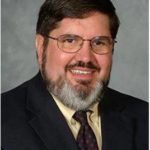 This Act Locally Waco blog post is by James Karney. James worked in a library beginning in his sophomore year of high school and after a more than thirty year library career recently retired as Director of the Waco-McLennan County Library. He’s currently taking a sabbatical working on projects around the house, catching up on reading and doing research on Texas statesman Coke Stevenson. He has been married to the super amazing and talented Anita Karney for 20 years and their son Jamie is a junior at Midway High School.
This Act Locally Waco blog post is by James Karney. James worked in a library beginning in his sophomore year of high school and after a more than thirty year library career recently retired as Director of the Waco-McLennan County Library. He’s currently taking a sabbatical working on projects around the house, catching up on reading and doing research on Texas statesman Coke Stevenson. He has been married to the super amazing and talented Anita Karney for 20 years and their son Jamie is a junior at Midway High School.
If you would like to write a post for the Act Locally Waco blog, please contact Ashley Thornton by email at [email protected] .
By Alfred Solano
What do new bike lanes, the Hippodrome reopening, Franklin Place, Dichotomy, Lula Jane’s, Muddle, Tinsley Place, Barnett’s Pub, and McLane Stadium all have in common? They’re all recent developments that have collectively changed the landscape of Downtown Waco during the past few years.
In 2010, we, as a community, began to dream and imagine what we want our city to look and feel like. The Imagine Waco plan was developed and adopted. Five years later, we look around and see a new, livelier downtown—one which we proudly call home. However, there is still much to accomplish. As we plan for the next five years of growth and development, we need to update the Imagine Waco plan and include everyone’s voice.
When the Imagine Waco plan was adopted in 2010, goals included activating the riverfront, building connections for people to get around, and creating an organization that implements development in Downtown Waco. More than two-thirds of Imagine Waco’s proposed action items are in the realization process. Over the past five years, public space investments have included improvements to sidewalks and crosswalks, added bike lanes, and new trees that have been added along streets to upgrade the walkways. Future shared spaces will include the transformation of the Heritage Square parking lot and the riverfront. Some of the private sector developments (leveraged by public investments) include Franklin Place, Tinsley Place, the Hippodrome, and Lula Jane’s. A small area planned for the “Near Northside” area around 15th and Colcord resulted in increased public and private investments, including streetscape improvements that beautified the intersection.
Organizational developments included the creation of the Downtown Development Corporation, 1,000 Friends of Waco, and efforts by the Sanger Heights and North East Riverside Neighborhood associations to improve their areas and business districts, according to the Imagine Waco plan.
Behind the scenes, the City of Waco has embedded principles from Imagine Waco into planning and engineering decisions. This paradigm shift has changed the design and the feel of projects and Downtown Waco altogether.
As we look at the first years of Downtown Waco’s renaissance and the series of projects that have been accomplished by private investors and the City during the last five years, we look ahead with excitement and anticipation about what is next for our city.
Five years ago, the Waco community dreamed together…and now it’s time to dream again!
What makes The Imagine Waco plan achievable and exciting is that it is designed by the people who live and work in the Waco area for the benefit of the entire Waco community. We want your dreams and aspirations to be a part of the Imagine Waco update. Next week, there will be severral opportunities for your voice to be heard. Everyone is invited and encouraged to give their input about the future of Downtown Waco.
- Monday, April 13th, The Jubilee Theater @ 6PM
(1315 North 15th Street, Waco, TX 76707) - Tuesday, April 14th, The Cen-Tex Hispanic Chamber of Commerce @ 6PM
(915 LaSalle Avenue, Waco, TX 76701) - Wednesday, April 15th, The Greater Waco Chamber of Commerce—1,000 Friends of Waco Meeting @ 10AM
(101 South 3rd Street, Waco, TX 76701) - Thursday, April 16th @ The Eastern Waco Development Corporation, 6PM
(715 Elm Street, Waco, TX 76704)
Is there something that was missed or left out of the initial plan? Are there some good things in Waco that could be made great? What do you want Downtown Waco to be known for? Come share your thoughts and let us know.
Waco’s beautifully diverse culture deserves your continued support. Let’s continue to work together to build up Waco in a way that benefits everyone!
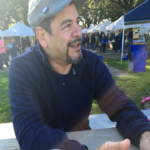 Alfred Solano was raised in Waco and is the Sales Manager for Texas Document Solutions. He and his wife Rachel are passionate about our city’s current trends and future possibilities. Alfred is the Vice President of the Business Resource Center, Waco’s downtown development corporation. He has served on the Board of Directors since its formation in 2011, representing the Cen-Tex Hispanic Chamber of Commerce.
Alfred Solano was raised in Waco and is the Sales Manager for Texas Document Solutions. He and his wife Rachel are passionate about our city’s current trends and future possibilities. Alfred is the Vice President of the Business Resource Center, Waco’s downtown development corporation. He has served on the Board of Directors since its formation in 2011, representing the Cen-Tex Hispanic Chamber of Commerce.
The Act Locally Waco blog publishes posts with a connection to these aspirations for Waco. If you are interested in writing for the Act Locally Waco Blog, please email [email protected] for more information.
By Jenuine Poetess
April is many things to many people. For some, April is about Autism Awareness & Advocacy. For others April shines a light on the presence of Child Abuse and how to prevent violence against youth in their homes. Some people celebrate their pets in April, other people honor the Earth, still others may go fly a kite. Here at the Arts & Culture blog, we’re celebrating Poetry! Among the myriad of causes, April is National Poetry Month. Established in 1996 by the American Academy of Poets, National Poetry Month strives to not only draw attention to poets and their works but also to inspire others to try their hand at writing verse. Poet Maureen Thorson is credited with initiating the NaPoWriMo challenge in 2003 in which participants endeavor to write 30 poems in 30 days throughout the month of April. If you are feeling ambitious, it’s not too late in the month to begin; check out the NaPoWriMo website for daily prompts and tips!
As a poet, sometimes I forget that for many people, poetry serves little to no purpose in their daily lives. Actually, this is quite a shocking realization for me to remember. I’ve been writing poems, in some form, since I was a little girl. I was a non-committal open mic attendee for many years after college and wrote every now and then when I was so moved. It wasn’t until I began attending weekly open mics and womyn’s writing circle at Tia Chucha’s Centro Cultural in Sylmar, CA in 2009 that I finally claimed my identity as Poet and began seriously practicing the written and spoken-word arts. I quickly found poetry to be my new way of life. I relished the rebellion of breaking grammar rules to arrange words on the page, without a care for punctuation or use of articles. Words themselves became the adornments of my expressions. Pure. Undiluted. Raw. Within this realm of reckless, wild, word-play, I found my own voice. I have known no other liberation so exhilarating as beholding the reflection of myself in the words I have poured upon my pages. I am certainly not the first, no the last to embark on this journey of self-knowing via pen and paper. Science fiction author, Octavia Estelle Butler affirms, “Every story I write, creates me. I write to create myself.”
Poet W. B. Yeats asserts, “out of the quarrel with others we make rhetoric out of the quarrel with ourselves we make poetry.” It is from within that quarrel with one’s self, that the truest aspects of our soul remain refined, after everything else has burned away. For most poets I know and by whom I am inspired, we write to shed light on truth with very little interest in keeping ourselves or others comfortable. The visceral art of poetry is to be unsilent, to provoke, to protest, to be—unflinching and unapologetic. It is up to the reader to divine meaning, to interpret call to action, to take away value.
Without hesitation or embellishment I candidly admit that poetry has saved my life on countless occasions. Whether it is the catharsis of purging my turmoil, heartache, outrage, or euphoria onto the page; or the validation of listening or reading others’ words putting into language thoughts, feelings, moments I too have experienced; or the deep joy of witnessing another come into bloom, finding their own voice and raising the volume to speak, with authority, their truths; writing has saved and changed my life. Mine is not the only testament to this fact. From youth and adults in correctional facilities, to those doing the work in therapy sessions, to cancer patients working through their mortality, to the grieving remembering their loved ones lost, to hearts pounding in love and desire, to joyful wonder captured spontaneous, people world-wide speak fluently the language of poetry.
Historically, poetry has been a dangerous occupation getting writers excommunicated at best and executed at worst. We have been outcast and exiled, tortured and isolated, we have been misunderstood and hated since the dawn of poetry. I promise you, it is not for the faint-of-heart. Poetry is born out of marrow and mire. It is a Phoenix rising again and again out of the ashes of our souls, the glowing remnants of what has been destroyed. Poetry is our rebirth. We write to know ourselves and we share to know each other. This is how we build community, through our creative expressions. Through speaking our truths. Through listening, with intention, to what each other is saying—deep within our words.
I do not write because it is nice or fun. Poetry is not a hobby or leisure activity. Poetry is among my personal hierarchy of needs. I must write. When my words are quiet, I feel it; I know it is a grave vital sign of my distress. Poetry is my compass and my map. Poetry is my truest mirror showing me unedited reflections of myself. Poetry is my measure and my portion. Poetry is both a part of me, and something entirely beyond me, all at once.
Get Involved!
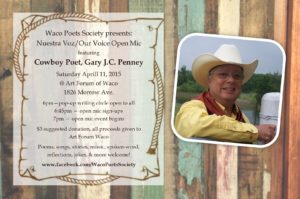 Waco Poets Society hosts an open mic every 2nd & 4th Saturday at the Art Forum of Waco, 7pm and welcomes the sharing of poems, songs, stories, spoken-word, reflections, jokes, and more!
Waco Poets Society hosts an open mic every 2nd & 4th Saturday at the Art Forum of Waco, 7pm and welcomes the sharing of poems, songs, stories, spoken-word, reflections, jokes, and more!- Challenge yourself to write 30 poems in 30 days—yes! haiku count! J
- Attend readings at the Austin International Poetry Festival featuring Nikki Giovanni April 9th-12th
- Attend Waco’s Annual WordFest, a part of the Waco Cultural Arts Festival in September 2015
- Stop by the Waco Poets Society booth any 2nd Saturday at the Waco Downtown Farmers’ Market to try your hand on our vintage typewriter or to play with magnetic words
Resources:
These are some of my go-to resources for practicing, contemplating, and exploring the written & spoken-word arts.
- NaPoWriMo – prompts and tips for writing 30 poems in 30 days of April
- Poem Crazy: freeing your life with words – by Susan G. Wooldridge
- Poetry as Spiritual Practice: using Poetry in Your Daily Rituals, Aspirations, and Intentions – by Robert McDowell
- Writing the Life Poetic: An Invitation to Read and Write Poetry – by Sage Cohen
- Skipping Stones is a rich multicultural literary and arts magazine for children and youth
 Jenuine Poetess is an artist, visionary, and community organizer. In 2010, she founded In the Words of Womyn (ITWOW), an international, grass-roots, written and spoken-word arts project with chapters throughout Los Angeles; Waco, TX; and Lebanon. ITWOW empowers womyn of all ages to give sound to our story and volume to our voice.HOT~ITWOW writing circle meets Mondays from 6-7:45pm at the Art Forum of Waco beginning February 2, 2015. Jenuine also founded Waco Poets Society which sponsors a local open mic venue in Sanger Heights. Meeting every 2nd & 4th Saturday at the Art Forum of Waco Nuestra Voz Open Mic invites community to share poems, songs, stories, spoken-word, and other creative expressions! In 2015, Jenuine along with a number of other artists creating and residing in Waco, co-founded the Central Texas Artist Collective (click link to learn more and get involved). You can contact her at: [email protected].
Jenuine Poetess is an artist, visionary, and community organizer. In 2010, she founded In the Words of Womyn (ITWOW), an international, grass-roots, written and spoken-word arts project with chapters throughout Los Angeles; Waco, TX; and Lebanon. ITWOW empowers womyn of all ages to give sound to our story and volume to our voice.HOT~ITWOW writing circle meets Mondays from 6-7:45pm at the Art Forum of Waco beginning February 2, 2015. Jenuine also founded Waco Poets Society which sponsors a local open mic venue in Sanger Heights. Meeting every 2nd & 4th Saturday at the Art Forum of Waco Nuestra Voz Open Mic invites community to share poems, songs, stories, spoken-word, and other creative expressions! In 2015, Jenuine along with a number of other artists creating and residing in Waco, co-founded the Central Texas Artist Collective (click link to learn more and get involved). You can contact her at: [email protected].
By Janae Griffiths
We are all busy people. We go about our days checking tasks off our lists, sometimes putting little thought into what we are actually doing. Often, this is harmless—we get everything done and no one gets hurt in the process. But, for those of us who have the opportunity to walk alongside someone in difficult circumstances or to offer assistance in a unique way, rushing through can do more harm than good.
I had not given this much thought until a few weeks ago, when I met with a wonderful woman named Stella. Stella lives here in Waco, and due to some life circumstances has found herself to be the recipient of multiple social services in our community. She shared with me part of her story—a part that made me uncomfortable. Stella spoke of feeling forced to become her own advocate, of not knowing what resources were available to her or how to tap into them. She felt like she couldn’t find anyone who would take the time to explain the available resources to her.
She told me about how she has sometimes felt like she was just another item to be checked off of someone’s to-do list. She felt like she was falling through the cracks, but had no way to stop it.
“The professionals need to be proactive in spreading information,” she explained. “They need to have the passion to go above and beyond, not just rush through.”
I didn’t know how to respond to her at first. I wasn’t with Stella as she made her way from place to place seeking help. I don’t know how the people working with her actually responded, the words they actually said, the looks on their faces, or the tone of their voices. I don’t know the pressures they were under, or how long their days had been, or even how Stella treated them. I certainly don’t know their intentions. I don’t know if they felt empathy, or annoyance, or kindness, or frustration. I don’t know if they tried their absolute best to help, or if they did indeed feel like Stella was just “another item to be checked off.”
I only know how Stella felt.
“In some places I felt valued, but in many places, I did not,” Stella explained. From her point of view, the people who worked with her seemed to expect that she would automatically know what was available to her, when she felt like no one had ever clarified what services she qualified for and which she did not. She felt uncomfortable and short on information.
As a graduate student at Baylor School of Social Work, I have spent the past two years interning for various Waco nonprofits and working to address needs in our community. One of the key values of the social work profession—which we are taught right at the start of Baylor’s program—is the inherent dignity and worth of every individual. I absolutely believe that every human has dignity and worth, and I am fairly certain that the Waco nonprofit and social service community as a whole believes the same. But, while I may believe those things in my mind, Stella’s story made me start to think about how much more challenging it is to honor those values in my day to day actions.
Of course social service professionals shouldn’t just rush through their work. We all know that. But, in the day in and day out busyness of the work day, it is easy to do.
Fortunately, Stella is a strong woman with a strong personality. She quickly educated herself on the resources available and became an advocate for herself and others that she knew. But, as she pointed out to me, not everyone can easily become their own self-advocate, especially individuals whose primary language isn’t English.
I deeply appreciate Stella sharing her experience with me. I have been reflecting on her words in the weeks since, and they have reminded me about why I entered the field of social work in the first place. I want to be someone who meets people where they are, recognizes them for who they are, and cheers for them as they take steps to become more. My hope is that I, as a member of the social service community in Waco, can approach my work with a renewed sense of the dignity and worth of each individual I have the opportunity to serve. My hope is that I never rush through my work, but take the time to treat each client with kindness and offer as much assistance as I am able.
I hope that I always remember Stella and how she feels. I hope I always remember how uncomfortable it feels not to have the information you need, how bad it feels to be treated like “another item on the list,” how scary it feels to be “falling through the cracks.” I hope that my actions with each person who comes my way will reflect the values I so fervently believe.
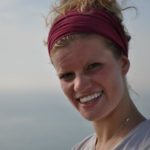 This Act Locally Waco blog post was written by Janae Griffiths. Janae is originally from Chicago, but has been happy to call Waco her home for almost six years! She is finishing her Master of Social Work degree from Baylor University, and currently interns at the Texas Hunger Initiative. She is passionate about issues of poverty and justice, especially in our community.
This Act Locally Waco blog post was written by Janae Griffiths. Janae is originally from Chicago, but has been happy to call Waco her home for almost six years! She is finishing her Master of Social Work degree from Baylor University, and currently interns at the Texas Hunger Initiative. She is passionate about issues of poverty and justice, especially in our community.
The Act Locally Waco blog publishes posts with a connection to these aspirations for Waco. If you are interested in writing for the Act Locally Waco Blog, please email [email protected] for more information.
By Carrie Kuehl
A ribboned birthday gift and the contents of your front seat fly onto the floor as you slam on the brakes to avoid hitting the car in front of you that just slammed on its own brakes. A squatty, blond dog with long ears squeals with the heavy bump of the car’s tire. He dashes to the safety of a front yard, still crying and licking at his paw. He has a bruised shoulder and skinned back foot. You are late for the party, but it’s no big deal.
Sleep has become a rare luxury since the pregnancy. Your toddler is teething and inconsolable. As the two of you finally doze off, two toms and a female begin vocalizing with mating wails which are heard outside the kitchen window, throughout the subdivision, and in the ears of your baby. Sigh…another chance to sleep will come tomorrow night; it’s no big deal.
The ambitious, dream-filled couple from Ohio are trying to decide: will they relocate to Waco or to Greenville, S.C.? They have good job possibilities in both. After a smooth flight they drive along Lake Shore Drive in their rental car. A new future is dancing through their minds when they see a dark shape in the road. It’s the contorted body of a beagle mix, similar to his boyhood best friend who was put to sleep in his arms only a few years before. Three blocks later they meet their realtor at charming little house in a neighborhood with big trees and just the kind of character they were hoping to find. The little house is so cute they almost don’t notice the thick, fluffy dog nosing through garbage and strewing it all over the yard next door and into the street. They do wrinkle their noses a little when the animal waste stench from a porch and yard across the street wafts into their nostrils. The real estate agent dismisses this as common. The couple decides to pursue the opportunity in Greenville. “Drat! I really thought we had them!” the realtor thinks as she hangs up the phone after hearing the news. “Oh well, you can’t win’em all. It’s no big deal.”
If you are still reading, you are likely an animal lover, or even if you aren’t, you have a deep concern and a strong sense of ownership for the future of Wacotown.
In 1988 a group of similarly concerned and dedicated Wacoans got frustrated with the neglect and suffering of animals and the negative effect this neglect was having on our city. When they found they could not get ahead of the problem by spending their free time cleaning poop at the animal shelter, this visionary group took the initiative to begin a spay/neuter program. The goal of this program was to prevent the suffering and dying of unwanted animals by preventing the births of unwanted litters.
That was a quiet year for spay/neuter. The clinic was only open one day a week back then, and they performed about 15 surgeries for cats or dogs a day. Today at the Animal Birth Control Clinic it is common for our licensed veterinarians and supportive staff of veterinary technicians to perform over 50 high-quality, affordable spay and neuter surgeries a day, five days a week. Back then huge numbers of cats and dogs poured into our rescue centers and into the shelter by the dozens daily, now the daily intake rarely goes over 25. And to top it off, our community just celebrated its third month of No Kill (90% or more of the animals exit alive)!
This decreased intake has been made possible because of a perfect mix of donor and taxpayer-funded spays and neuters, and because of transparent communication among goal-focused partners. We all benefit from the safer living and higher quality of life that is the result of this reduced burden on our community.
The next step is upon us. The shelter is being reconstructed to properly care for the remaining cats and dogs who find themselves in need of temporary care. The community campaign, heartily led by Mayor Malcolm Duncan, is wrapping up within weeks. I welcome you to contribute to this project and to support spay/neuter.
The reasons to support spay/neuter and to continue to lift this burden on our community are tangible and intangible, direct and indirect. Here are a few:
- To enjoy your afternoon birthday party rather than having it derailed by a car accident because the car in front of you hit a stray,
- To have a peaceful night of sleep and sanity for yourself and your toddler because the feral cat mating “opera” has been taken off of the marquee,
- To woo young professionals to our Waco neighborhoods instead of giving them a reason to start their bright futures elsewhere.
Quality of life and safety for humans intersects with the lives of the cats and dogs in our city more often than we sometimes realize. This work must continue. It IS a big deal, and it affects us all!
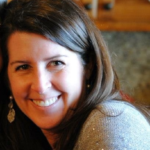 This Act Locally Waco blog post was written by Carrie Kuehl. Carrie is an enthusiastic Wacoan who began her time at the Animal Birth Control Clinic as a volunteer in 1994. Her BA in Sociology from Baylor, ten years in the financial planning/securities industry, and her passion for the efficiency of spay/neuter prepared her to become the Executive Director of ABC in 2006. In the last few years, Carrie has enjoyed growing the clinic and mentoring additional Texas communities to boost their spay/neuter impact. In her personal time, she enjoys kayaking, houseboating, and being an aunt.
This Act Locally Waco blog post was written by Carrie Kuehl. Carrie is an enthusiastic Wacoan who began her time at the Animal Birth Control Clinic as a volunteer in 1994. Her BA in Sociology from Baylor, ten years in the financial planning/securities industry, and her passion for the efficiency of spay/neuter prepared her to become the Executive Director of ABC in 2006. In the last few years, Carrie has enjoyed growing the clinic and mentoring additional Texas communities to boost their spay/neuter impact. In her personal time, she enjoys kayaking, houseboating, and being an aunt.
The Act Locally Waco blog publishes posts with a connection to these aspirations for Waco. If you are interested in writing for the Act Locally Waco Blog, please email [email protected] for more information.

